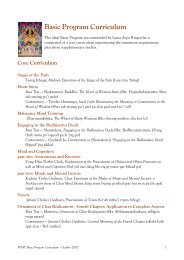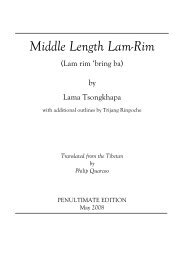How to Generate Bodhicitta (English) - Amitabha Buddhist Centre
How to Generate Bodhicitta (English) - Amitabha Buddhist Centre
How to Generate Bodhicitta (English) - Amitabha Buddhist Centre
Create successful ePaper yourself
Turn your PDF publications into a flip-book with our unique Google optimized e-Paper software.
technique and exchanging oneself with others as taught by Lama Tsong Khapa. So please be attentive andgenerate this strong intention: "I am definitely going <strong>to</strong> practise and develop bodhicitta in my mind."Visualise in front of you three people: first, someone who upsets you—just by seeing or thinking about him orher, your mind becomes unhappy. Next <strong>to</strong> him or her, visualise someone you love and are close <strong>to</strong>—just byseeing this person your mind becomes happy. And next <strong>to</strong> that person, visualise a stranger, someone who isneither beneficial nor non-beneficial. When you think about these people, you feel aversion <strong>to</strong>wards theperson you dislike, attachment <strong>to</strong>wards the person who is close <strong>to</strong> you, and indifference <strong>to</strong>wards the stranger.Now, thinking about the person you dislike, ask yourself, "Why do I dislike this person? What is the reason Iget so upset? What has he done <strong>to</strong> me?" You will realise that this is because he has harmed you a little bit inthis life. At this point you should think about the uncertainty of friends and enemies as explained in the lam-rim,in the section for the person of intermediate scope. This is one of the disadvantages of cyclic existence: youcannot be sure of friends and enemies; sometimes a friend becomes and enemy and sometimes an enemybecomes a friend. Think in this way: "Although this person has given me a small amount of harm in this life fora very short time, in many previous lifetimes since beginningless time, this person has shown me greataffection and has been very close <strong>to</strong> me for a very long time. The harm he has given me in this life is so smallcompared <strong>to</strong> the closeness and affection we have had since beginningless time, yet I treat him like myultimate enemy, the ultimate object <strong>to</strong> be avoided. This is completely wrong!" You need <strong>to</strong> think in this wayagain in order <strong>to</strong> subdue your feelings of aversion for this person.Next <strong>to</strong> him is the person you feel close <strong>to</strong>, who makes you feel so happy as soon as you see him or her. Youregard this person as your ultimate friend, the person who is closer <strong>to</strong> you than anyone else. You have somuch attachment for this person you may feel that you don't want <strong>to</strong> be separated from him or her for even amoment. If you examine the reasons why this is so, it is because in this life he has benefited you in some waysuch as with resources and so forth. On the basis of some very small benefits and for very limited reasons,your mind becomes so happy and excited. <strong>How</strong>ever, you should think, "Although in this life he has benefitedme a little, he has not always been my friend. In many previous lifetimes since beginningless time, he hasbeen my enemy. He harmed me so much that just by seeing him I felt very strong aversion. It is notreasonable for me <strong>to</strong> have so much attachment and desire for this person just because he has benefited me,is beneficial <strong>to</strong> me and will benefit me, because he has also been the opposite." By thinking in this way overand over again, you can subdue your feelings of attachment.Now turn <strong>to</strong> the stranger. The attitude you have <strong>to</strong>ward this person is: "I don't know this person and I don'tcare about him. He hasn't connected with me in the past, he is not connecting with me now and he will notconnect with me in the future, so who cares." This attitude is also completely wrong, so you should think, "Inthis life, this person is neither an enemy nor a friend, but in previous lives he was my enemy many times, andalso many times he was my dearest friend, someone I was very close <strong>to</strong>. Therefore, it is completelyunreasonable <strong>to</strong> be indifferent <strong>to</strong> this person." Just as you equalised your feelings <strong>to</strong>wards the friend and theenemy, you should equalise your feelings <strong>to</strong>wards the stranger by thinking this way again and again.Therefore when you meditate, you first think that there is absolutely no reason <strong>to</strong> be so upset and feel somuch aversion <strong>to</strong>wards the enemy who has been your dearest friend so many times. You need <strong>to</strong> think aboutthis again and again in order <strong>to</strong> subdue your aversion and equalise your mind <strong>to</strong>wards this person. Likewise,think that there is no reason <strong>to</strong> be so attached <strong>to</strong> the person you are close <strong>to</strong>, your friend, because he hasbeen your enemy so many times. Think about this again and again <strong>to</strong> subdue your attachment and equaliseyour mind <strong>to</strong>wards this person.When we perceive these three different people, we perceive them in terms of these three categories: friends,enemies and strangers. <strong>How</strong>ever, none of them exists in this way forever—no one is a friend, enemy orstranger for all time. Therefore, they are all the same. There is absolutely no reason <strong>to</strong> feel attachment<strong>to</strong>wards one person, <strong>to</strong> feel aversion <strong>to</strong>wards another, and <strong>to</strong> feel detached and indifferent <strong>to</strong>wards yetanother.If we examine what they actually are, from their side, they are sentient beings. And they are all exactly thesame in that they all wish <strong>to</strong> be happy and free from suffering. Thus there is not the slightest reason <strong>to</strong>discriminate between them with attachment, aversion and indifference. They are all exactly the same. Youmust come <strong>to</strong> this conclusion and meditate on it again and again. By meditating on this over and over again,you will reach the point where you actuall develop equanimity <strong>to</strong>wards all sentient beings. You will feel that












